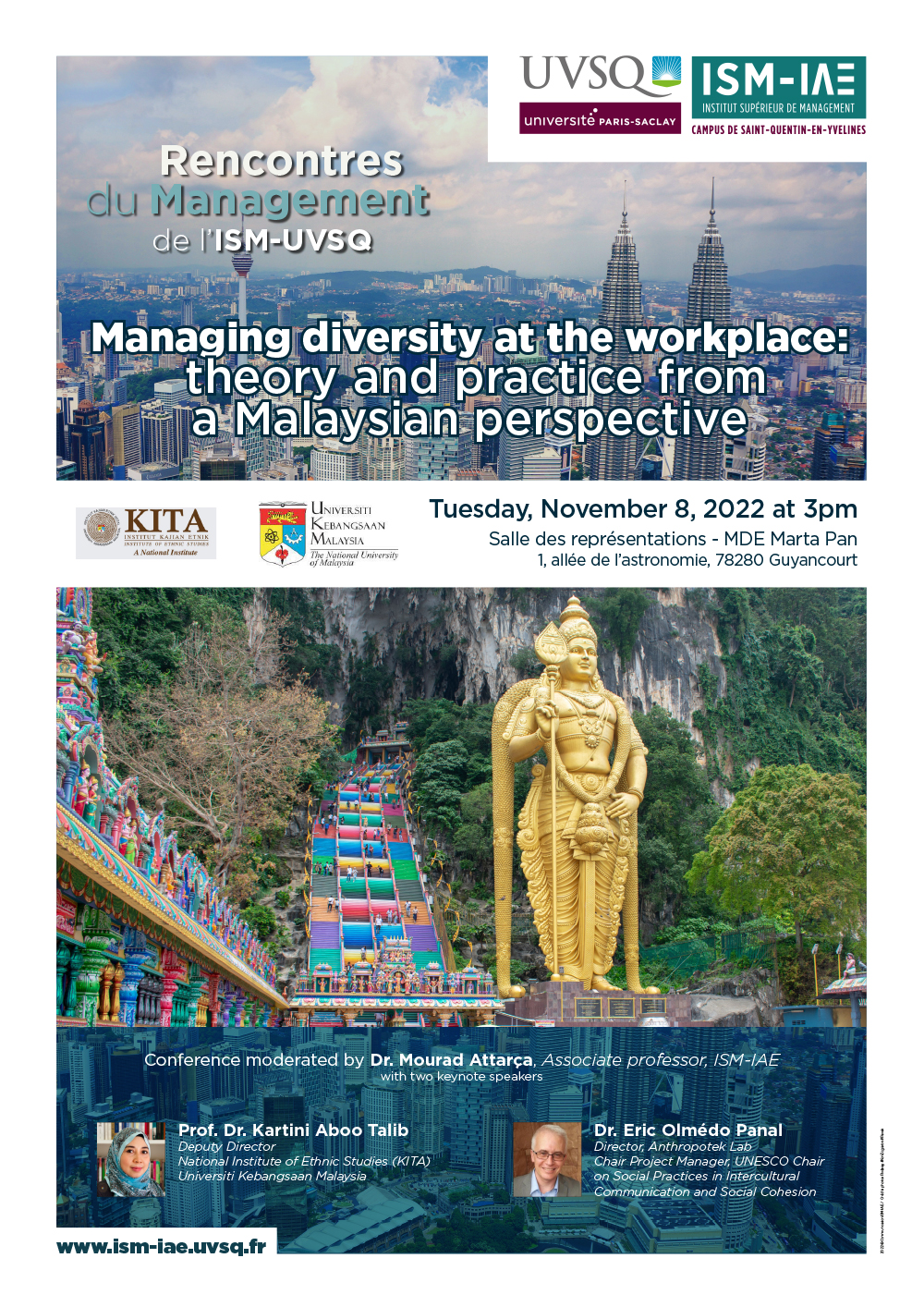Vous êtes ici : ISM-IAEFRL'ISM-IAEÉvénementsRencontres du management
- Partager cette page :
- Version PDF
Managing diversity at the workplace: theory and practice from a Malaysian perspective
Dans le cadre de ses activités pédagogiques et de recherche, l’ISM-IAE organise le mardi 8 novembre 2022 une conférence sur le thème : « Managing diversity at the workplace: theory and practice from a Malaysian perspective », avec les interventions du Pr. Kartini Aboo, Deputy Director, National Institute of Ethnic Studies (KITA), Universiti Kebangsaan Malaysia et du Dr. Eric Olmédo Panal, Director, Anthropotek Lab, UNESCO Chair on Social Practices in Intercultural Communication and Social Cohesion.
le 8 novembre 2022
le mardi 8 novembre 2022 à 15h
Salle des représentations (sous réserve de confirmation)
Maison de l'étudiant - Marta Pan
1, allée de l'astronomie
78280 Guyancourt
Maison de l'étudiant - Marta Pan
1, allée de l'astronomie
78280 Guyancourt
Abstract
The concept of diversity in Malaysia is often viewed through an ethnic lens. Malaysia is a multi-ethnic society, yet constitutionally endowed with a policy of affirmative action toward specific social groups. In order to manage diversity in Malaysian workplaces, it is therefore essential to understand the postcolonial legacy that led to the country’s current social structure. Such deep understanding does not usually resonate with multinational companies that set up subsidiaries in Malaysia, as they tend to apply the precept of the “anthropotechnological island” (Wisner, 1997), whose strategic aim is to produce cultural assimilation in order to fluidify the global supply chain. The pivotal question at the core of this seminar is a simple one: do these anthropotechnological islands really work in the social reality? In order to answer accurately, we will review briefly at first Malaysia’s social history, as well as the country’s constitutional key-principles. After a short critical discussion, we will then present two live-case studies of diversity management in both manufacturing and service industry sectors, involving giant multinational companies. The final part of this seminar is dedicated to an open discussion where participants will be invited to discuss the merits and the setbacks of creating anthropotechnological islands in the global economy.
Prof. Dr. Kartini Aboo Talib @ Khalid is a political scientist and the deputy director of the Institute of Ethnic Studies (KITA) at the National University of Malaysia (Universiti Kebangsaan Malaysia). Her areas of specialization are policy analysis, political parties, comparative studies, gender and civil societies. She is a country consultant for the United Nations on women empowerment and gender equality, as well as a public commentator.
Dr. Eric Olmedo is a sociologist and principal research fellow at the Institute of Ethnic Studies (KITA) at the National University of Malaysia (Universiti Kebangsaan Malaysia). His areas of interest are sociology of work, anthropology of organisations, as well as cultural anthropology and sustainable food systems. He is the founder and director of Anthropotek, an applied-anthropology laboratory.
The concept of diversity in Malaysia is often viewed through an ethnic lens. Malaysia is a multi-ethnic society, yet constitutionally endowed with a policy of affirmative action toward specific social groups. In order to manage diversity in Malaysian workplaces, it is therefore essential to understand the postcolonial legacy that led to the country’s current social structure. Such deep understanding does not usually resonate with multinational companies that set up subsidiaries in Malaysia, as they tend to apply the precept of the “anthropotechnological island” (Wisner, 1997), whose strategic aim is to produce cultural assimilation in order to fluidify the global supply chain. The pivotal question at the core of this seminar is a simple one: do these anthropotechnological islands really work in the social reality? In order to answer accurately, we will review briefly at first Malaysia’s social history, as well as the country’s constitutional key-principles. After a short critical discussion, we will then present two live-case studies of diversity management in both manufacturing and service industry sectors, involving giant multinational companies. The final part of this seminar is dedicated to an open discussion where participants will be invited to discuss the merits and the setbacks of creating anthropotechnological islands in the global economy.
Prof. Dr. Kartini Aboo Talib @ Khalid is a political scientist and the deputy director of the Institute of Ethnic Studies (KITA) at the National University of Malaysia (Universiti Kebangsaan Malaysia). Her areas of specialization are policy analysis, political parties, comparative studies, gender and civil societies. She is a country consultant for the United Nations on women empowerment and gender equality, as well as a public commentator.
Dr. Eric Olmedo is a sociologist and principal research fellow at the Institute of Ethnic Studies (KITA) at the National University of Malaysia (Universiti Kebangsaan Malaysia). His areas of interest are sociology of work, anthropology of organisations, as well as cultural anthropology and sustainable food systems. He is the founder and director of Anthropotek, an applied-anthropology laboratory.

Inscription
> S'inscrire en ligne à l'événement.








